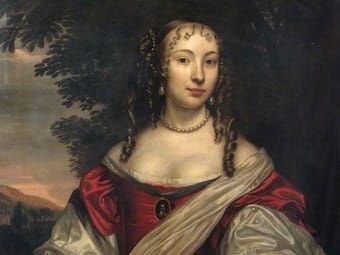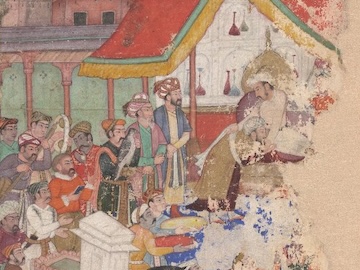Henrietta of England (1644-1670), the youngest daughter of King Charles I and thus Charles II’s sister. Louis XIV was her cousin, and they were brought up together in the French court after she was taken their for safety in 1646, three years before her father’s execution in 1649. Henrietta subsequently married another cousin, Philippe I, Duke of Orléans, but the marriage was not happy. Her connections and ready intelligence won her the role as go-between in negotiations for the secret Treaty of Dover in May 1670, just a month before she unexpectedly died at home in St Cloud; Henrietta was sure she had been poisoned, though the doctors who performed the autopsy would not commit themselves.
THE ends of which were, that Louis XIV should give Charles 200,000 l. a year, in order to enable him to re-establish the popish religion in England, and render his power independent of parliament;* and should send forces to his assistance, in case insurrections should arise in his kingdom; and that, after the interests of religion were secured, the two monarchs should join their forces by sea and land for the destruction of the Dutch commonwealth,* and divide its dominions between them and Charles’s nephew, the young Prince of Orange.*
The scheme was immediately laid before Charles, who adopted it: And Lord Arundel was dispatched to Paris with the proposal. Louis XIV consented to the terms asked, but with an intention to prevail afterwards upon Charles to reverse the order of the project, and begin with the attack upon Holland. The treaty was however drawn up upon the original plan, by Sir Richard Bealing,* and agreed to in the beginning of the year 1670 by both Princes. But a secret, the objects of which were so dangerous to the rest of Europe, was kept concealed from all, both in France and England.
* According to the Measuring Worth website, £200,000 in 1670 is equivalent to about £32,780,000 today. Charles not only wanted to be free from Parliamentary scrutiny and control; he passionately believed in ‘the divine right of kings’, i.e. that Catholic Kings were anointed to bear sole responsibility for their realms and hence democratic constitutional monarchy was contrary to God’s will.
* Relations between England and Holland were stupidly fractious: the two Protestant countries emerged as significant maritime trading and colonial powers more or less together, but instead of trading freely with each other they faced off as rivals. The Dutch were horrified by the execution of Charles I, and Cromwell’s republican government then introduced the protectionist Navigation Acts that restricted access to English ports and subjected foreign vessels to searches. There were three outbreaks of hostilities, the Dutch Wars of 1652-4, 1665-7 and 1672-4.
* This was William III (1650-1702), Prince of Orange, who later became King William III of Scotland and England. His mother Mary, Princess of Orange, was Charles II’s sister; young William had inherited his title at birth, owing to the death of his father William II just a week before. Young William was a committed Protestant but, as with the people of England, in the matter of his forthcoming conversion to Romanism he was not consulted.
* Sir Richard Bellings (1622-1716) or Bealings, or Bealing as Dalrymple has it, was principal secretary to Queen Catherine of Braganza, Charles II’s consort. He was a Roman Catholic, whom Charles had sent to Rome in 1662 to try to broker reunion with the Pope. The Treaty of Dover was concluded in May 1670, but never bore fruit because Charles lost his battle of wills with Parliament; he finally converted to the Roman Church on his deathbed in 1685.
Questions for Critics
1. What is the author aiming to achieve in writing this?
2. Note any words, devices or turns of phrase that strike you. How do they help the author communicate his ideas more effectively?
3. What impression does this passage make on you? How might you put that impression into words?
Based on The English Critic (1939) by NL Clay, drawing on The New Criticism: A Lecture Delivered at Columbia University, March 9, 1910, by J. E. Spingarn, Professor of Comparative Literature in Columbia University, USA.
Précis
Their treaty provided that until England was declared Catholic again, Louis would supply Charles with money so he could defy his Parliament, and with troops so he could quell any resistance from the public. Protestant Holland would then be carved up between them. Recognising its scandalous nature, Charles ensured that only a handful of trusted officials knew of the deal. (60 / 60 words)
Their treaty provided that until England was declared Catholic again, Louis would supply Charles with money so he could defy his Parliament, and with troops so he could quell any resistance from the public. Protestant Holland would then be carved up between them. Recognising its scandalous nature, Charles ensured that only a handful of trusted officials knew of the deal.
Variations: 1.increase the length of this precis to exactly 65 words. 2.reduce the length of this precis to exactly 55 words. 3.introduce one of the following words into the precis: because, besides, just, otherwise, ought, unless, whereas, whether.
Archive
Word Games
Jigsaws Based on this passage
Express the ideas below in a single sentence, using different words as much as possible. Do not be satisfied with the first answer you think of; think of several, and choose the best.
Spinners Find in Think and Speak
For each group of words, compose a sentence that uses all three. You can use any form of the word: for example, cat → cats, go → went, or quick → quickly, though neigh → neighbour is stretching it a bit.
This exercise uses words found in the accompanying passage.
1 Former. Term. Very.
2 Arise. However. Up.
3 Complete. Establish. Zeal.
Variations: 1. include direct and indirect speech 2. include one or more of these words: although, because, despite, either/or, if, unless, until, when, whether, which, who 3. use negatives (not, isn’t, neither/nor, never, nobody etc.)
Prepositions Find in Think and Speak
Each of the words below may be followed by one or more prepositions. Compose your own sentences to show which they might be. Some prepositions are given underneath.
This exercise uses words found in the accompanying passage.
1. Secure. 2. Prevail. 3. Agree.
Selected Prepositions
About. Against. Among. At. By. For. From. In. Into. Of. On. Out. Over. Through. To. Towards. Upon. With.
Add Vowels Find in Think and Speak
Make words by adding vowels to each group of consonants below. You may add as many vowels as you like before, between or after the consonants, but you may not add any consonants or change the order of those you have been given. See if you can beat our target of common words.
lps (8+1)
elapse. elopes. laps. lapse. leaps. lips. loops. lopes.
lops.
Post Box : Ask Nicholas
Grok : Ask Grok
You are welcome to share your creativity with me, or ask for help with any of the exercises on Clay Lane. Write to me at this address:
See more at Post Box.
If you like what I’m doing here on Clay Lane, from time to time you could buy me a coffee.
Buy Me a Coffee is a crowdfunding website, used by over a million people. It is designed to help content creators like me make a living from their work. ‘Buy Me a Coffee’ prides itself on its security, and there is no need to register.
Related Posts
Scottish scholar and clergyman Gilbert Burnet sets before us a picture of a King who was something of a Solomon in his virtues and his vices.
Picture: By Daderot, Wikimedia Commons. Licence: Public domain.. Source.
Posted April 24 2022
Only months after kidnapping the Duke of Ormond, Irish radical Thomas Blood was at it again, this time attempting to steal the Crown Jewels.
Picture: © CEphoto, Uwe Aranas, Wikimedia Commons. Licence: CC BY-SA 4.0.. Source.
Posted January 13 2022






